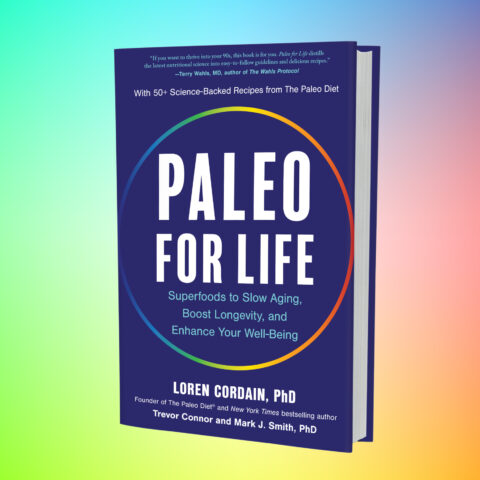The Folate Cycle: One Reason an Omnivore Diet is Healthiest

Reviewed by Dr. Mark J. Smith and Trevor Connor on December 31, 2022
Since veganism hit its peak in popularity only a few short years ago, the carnivore diet has recently become all the rage.
Opposite to its predecessor, the carnivore diet is based on eating only red meat, fish, poultry, and eggs, and in many cases, organ meats. Which may even sound like a true version of The Paleo Diet®. After all, The Paleo Diet is often referred to as the “caveman diet”. However, you may be surprised to learn that in an analysis of over 200 hunter-gatherer societies, not a single society was completely carnivore or vegan. In fact, all landed somewhere in between as omnivores. [1]
What do Omnivores Eat?
An omnivore diet is a natural, well-balanced diet that includes both plants and animals. The omnivore diet feeds the body with a mix of foods, ensuring all essential nutrients are consumed.
If you’re a plant-based eater considering an omnivore diet, or The Paleo Diet, first remember the Paleo Diet is a flexible diet and many variants can be considered plant-based.
If you still aren’t convinced that going Paleo is healthier than veganism, here are some of the consequences you may be facing by removing animal foods from your diet. First, let’s get into the folate cycle and explain its role in your health.
The Folate Cycle
The folate cycle is a pathway critical to proper cellular function and metabolism. It plays an important role in DNA repair. [2]
This important cycle requires nutrients from animal foods in order to function – specifically vitamins B12 and B6. This means that eating diets without meat may cause the folate cycle to stop functioning properly and contribute to elevated levels of homocysteine. High homocysteine levels increase the risk of heart disease and stroke – even more than high cholesterol!
In India, where the majority of the culture follows a vegan diet for religious purposes, research has shown that there are high rates of heart disease among the population, with indicators pointing to low B12 and elevated homocysteine levels. [3]
As one would expect, the folate cycle also requires folate, on top of vitamins B12 and B6 to function, but we can get folate from plant and animal sources. Let’s dive deeper into all three of these nutrients.
Vitamin B12
Vitamin B12 is an essential vitamin needed to form red blood cells and DNA, and is one of the three key nutrients in the folate cycle, preventing homocysteine buildup.
The role of vitamin B12 in DNA repair includes repairing brain cells. Insufficient levels of B12 found in elderly people have led to incorrect diagnoses of Alzheimer’s, when in fact, they were just deficient in vitamin B12. [4]
There are only two ways to get B12 – from meats and seafood, or through supplementation. If you’re following a vegan or vegetarian diet, you’ll need to take supplements as there are no plant sources containing vitamin B12.
Vitamin B6
Vitamin B6 is also an essential vitamin in the folate cycle. We can get vitamin B6 from both plant and animal sources, however, each formulates different forms of the vitamin, impacting its bioavailability.
Plants synthesize pyridoxine as a means to protect the plant from the UVB radiation of sunlight. This natural protective barrier in plants greatly impacts the bioavailability of vitamin B6, reducing its capacity by 75-80 percent, whereas the bioavailability of vitamin B6 from animal sources reaches close to 100 percent. [5]
Folate
Folate is a B vitamin found naturally in many foods, particularly meat, and is the last of three key nutrients needed in the folate cycle.
Folate is found in both plants and animal sources, but also comes in a synthetic form called folic acid. The B vitamin you’ll find in supplements, or in fortified foods, is not folate but rather its synthetic counterpart, folic acid. This is important because folic acid is formulated in a lab – it doesn’t exist in nature. Folic acid, found in supplements, has been linked to forms of cancer.
People with low blood levels of folate may be more prone to depression and also may not respond well to antidepressant treatment. If that’s the case for you, before you run to your nearest supplement shop, consider boosting your folate levels through your diet. Your best sources are green leafy vegetables, liver, and seafood.
The Bottom Line
Eliminating either plant or animal foods from our diet can result in deficiencies. This is why an omnivore diet is the most natural way of eating for humans. In fact, it’s the easiest way to get the variety of essential vitamins, minerals, and amino acids that we need.
References
- Cordain L, Miller JB, Eaton SB, Mann N, Holt SHA, Speth JD. Plant-animal subsistence ratios and macronutrient energy estimations in worldwide hunter-gatherer diets. The American Journal of Clinical Nutrition 2000;71:682–92. doi:10.1093/ajcn/71.3.682. https://academic.oup.com/ajcn/article/71/3/682/4729121
- Zheng Y, Cantley LC. Toward a better understanding of folate metabolism in health and disease. Journal of Experimental Medicine 2018;216:253–66. doi:10.1084/jem.20181965.
https://www.ncbi.nlm.nih.gov/p… - Mahalle N, Kulkarni MV, Garg MK, Naik SS. Vitamin B12 deficiency and hyperhomocysteinemia as correlates of cardiovascular risk factors in Indian subjects with coronary artery disease. Journal of Cardiology 2013;61:289–94. doi:10.1016/j.jjcc.2012.11.009.
https://doi.org/10.1016/j.jjcc… - McCaddon A. Vitamin B12 in neurology and ageing; clinical and genetic aspects. Biochimie 2013;95:1066–76. doi:10.1016/j.biochi.2012.11.017. https://www.sciencedirect.com/…
- Reynolds RD. Bioavailability of vitamin B-6 from Plant Foods. The American Journal of Clinical Nutrition 1988;48:863–7. doi:10.1093/ajcn/48.3.863. https://academic.oup.com/ajcn/…
Irene Jay
Irene Jay is a Holistic Health Coach and a certified Nutrition Coach from Vancouver, BC.
More About The Author




